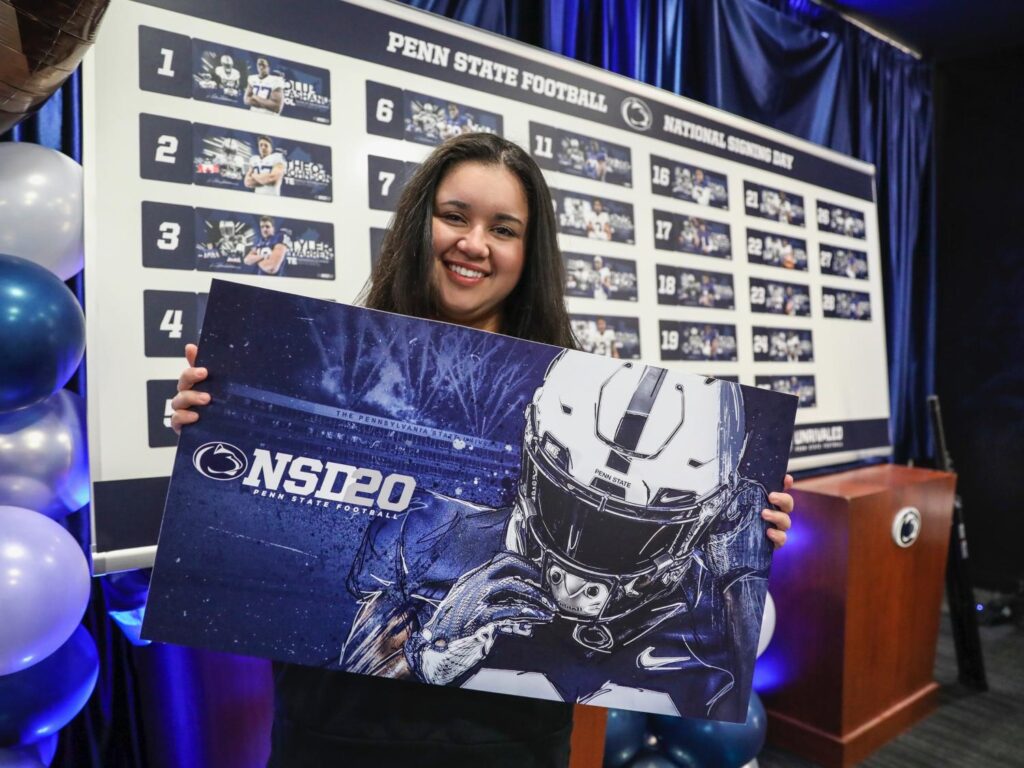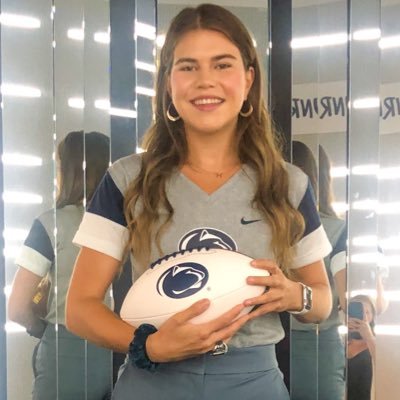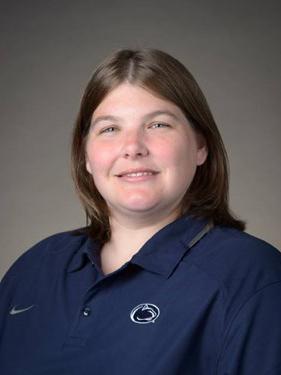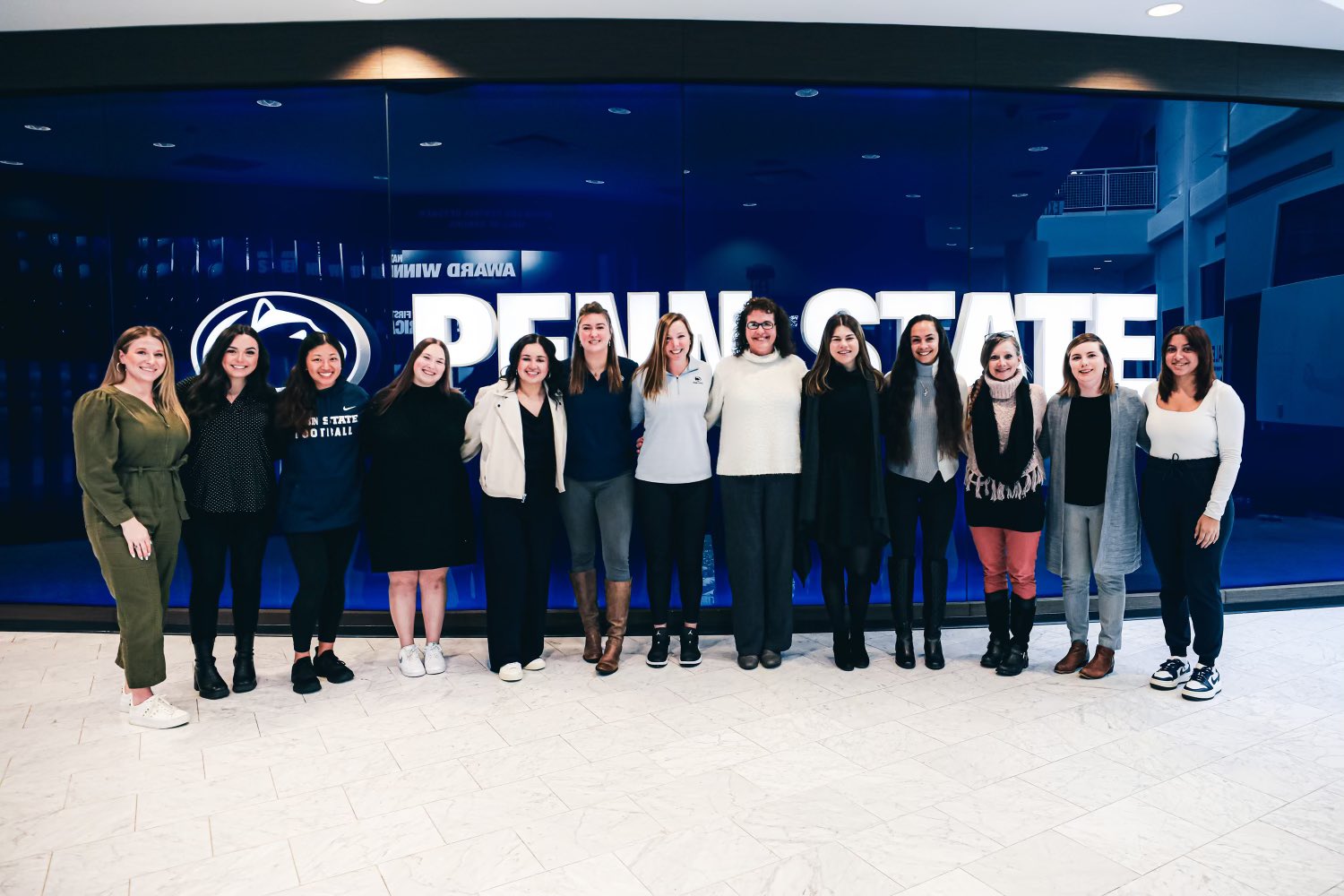You hear a lot about head coaches, assistant coaches and the idea of ever-growing support staffs across college athletics. Football is as much an arms race to collect actual on-field talent as it is growing a small army behind that talent. Walk into Penn State’s Lasch Building and you’re just as likely to see someone who doesn’t play football as you are someone who does.
In most cases, when talking about the nuts and bolts of a football program the conversation steers toward men. That’s not anything nefarious; it’s how the demographics of the sport play out. But for Penn State football — like many college football programs across America — women are rising through the ranks to positions of more and more power.
StateCollege.com sat down with 10 women with key roles throughout the Nittany Lion program. From nutrition and recruiting to James Franklin’s right hand [wo]man, the fabric and success of Penn State football is woven as much by the women in the building as the men. Here are their stories.
This is the first of a three part series covering women within the Penn State football program. Broken into three parts the series will feature operations, strength/nutrition and recruiting. Today’s part 1 will focus on operational roles: Destiny Rodriguez, director of external operations; Heidi Erb, assistant to head coach; Angie Hummel, administrative support assistant; and Kristina Petersen; senior associate athletic director for communications and content. (Petersen still maintains her role with football but took over in a new role within athletics following this interview.)
StateCollege.com: Let’s start with the basics. Describe your role with the program.
Destiny Rodriguez: I was previously doing the recruiting business and operations. [In this role] I’m the director of external operations. So I am the liaison between our creative services — graphic designers, video team, communications, our donor group and marketing. So a lot of the programs that are helping us on game days and year round and being the voice for the program and for Coach Franklin in those meetings and making sure that we’re representing ourselves in the way that aligns with our core values and what Coach Franklin has set for the program.
Heidi Erb: My title is executive assistant to the head coach. I wear a lot of different hats. … It’s kind of expanded into so many different areas and responsibilities. First and foremost, my position basically is being Coach Franklin’s right hand. I oversee and manage his day-to-day calendar. He has so much going on throughout the day that he really depends on just being able to look at his phone and look at his calendar to tell him what’s next. … I also oversee the coordination and the logistics of setting up several meetings with the players, so the leadership meetings, the first-year player meetings, any kind of like disciplinary meetings that he needs to set up with players and staff members, I usually organize that.
And then something that I’m in the midst of right now is I also oversee Coach Franklin’s recruiting and business travel. Right now we’re in the midst of a contact period. For the past week and a half he’s been traveling across the country, visiting high schools and visiting our commits and getting into homes and stuff like that, so I’m in charge of the private plane travel. [Erb would later note that she’s also in charge of Franklin’s famous helicopter rides for certain high school visits.] I’m setting up the home visits, setting up the cars, setting up the hotels, creating the itineraries, creating the different reports when he goes into a school so that he knows, you know what players are in those schools and really giving him that whole recruiting packet.
Also, whenever there is a team meeting or any kind of event that he’s getting in front of the team, he has a PowerPoint. So during the season, everyday that we practice and then during spring ball and then also during training camp, he does the quote of the day, any highlights of the day, anything newsworthy or noteworthy in the media that he wants the team to be aware of. And then he basically goes into preparing the team for the day. I’m kind of responsible for putting it together. His PowerPoints are very detailed, they’re usually like 20-some slides at least, so that’s kind of a full time job in itself.
Angie Hummel: I am an administrative assistant for football administration and operations. My primary responsibilities include processing of all expenses/income that come through the football program as well as assist in day-to-day operations of the program. I assist in processing contracts with all vendors/suppliers that football works with directly. Assist with coaches’ travel and reimbursements. I also assist with the Lettermen’s Club in managing game day operations, membership renewals, etc.
Kristina Petersen: My role in the program is to manage all of James Franklin’s media appearances and press conferences and anything kind of related to external communications as a whole.

SC:People don’t end up working for a major college football program by mistake. How did we get here?
Rodriguez: I started as an intern, I was working with [Former Director of Operations] Michael Hazel and I thought I had life figured out. I had a job lined up with Marriott and was graduating early. I was taking like 21 credits while I was interning here. I wanted to work in sports, but never really found a way in through college until the very end. … I ended up calling Marriott and saying “Hey, I think I’m going to stay and be an unpaid intern and hope for the best and see if it works out,” and it did.
Coach asked me if I wanted to stay on, so I stayed past graduation, became the director of ops for men’s soccer here on campus and then nine months later coach called me. I took an entry level position in recruiting and was then promoted a year later, and then promoted, again. And then when Michael left, they kind of changed up the operational group and restructured it a little bit. I was lucky enough that coach and Kevin [Threlkel], our chief of staff, asked me if I’d be interested in that role. It’s been a dream of mine since I started. I wanted to be in operations or director of operations in some sort. So when that opportunity opened up, I was hoping that I would be a candidate for it. I’ve been with coach for a really long time. I feel like I know him and Kevin and the staff really well. It’s kind of weird. I might be one of the younger ones on staff, but I’ve been here, the longest out of the group. So I mean, it’s an honor. It’s a privilege to be here. It’s a privilege to work with Coach Franklin and his staff. And I don’t take for granted being this young in this role. Every day, it’s a goal to to be better. You know, I’m competitive as we all are in this industry.

Hummel: My position required experience with Penn State financial systems, purchasing, contracts, etc., which I had experience with before my position here in football. I do realize that a lot of times in this industry that having connections to someone perhaps within the program or that may know someone tends to be the case, but in mine it was not. I got this position based on my knowledge, experience and personality of the particular position I hold here.
Erb: Knowing that early on this was what I wanted to do, I poured myself into it. So I would get done with class around two o’clock and I would stop at my dorm, change my clothes and come into the office and I would work with Michael until probably 12 or one o’clock in the morning. Just helping him with anything that he could do and then, through that internship opportunity, I was able to help him organize events like the women’s clinic. And camp, and, you know, just get those opportunities to work with the whole staff.
So I started working more with Kevin, who was the director of football administration. I started working more with Andy Frank, who was director of recruiting. Then when I graduated the opportunity opened up for an assistant recruiting coordinator for operations and visits, I was able to interview for that job and they knew who I was I already and had preexisting relationships. So it made it that much easier to be hired into that role. … It’s the bottom of the totem pole, but that was something that I was aware of, and so I looked for any opportunity that I could to grow and I did the things that I was given really, really well. So you know, even if it was a small thing, I was gonna do it really, really well. And I think Coach Franklin took note of how organized I was. He saw how dedicated I was. So when the opportunity opened up he came to me right away and was like, “Heidi, I want you in this role.”
Petersen: We got here because I was working strategic communications for women’s basketball and in a shift of some responsibilities and whatnot after Sandy Barbour’s arrival we ended up having an opportunity to interview to be the primary media person or communications person for the football program. And apparently I interviewed OK and they chose me to serve in that role. And so I had that role from the spring of 2015 until January of 2020, when I took my current position.

Biggest challenge you face on a daily basis?
Rodriguez: It’s a lot of people. It’s a lot of different groups. It’s a lot of questions. And along with that there’s still the normal team operations going on throughout the day. So just keeping everyone aligned and on the same path and, and making sure we’re staying true to Penn State football but also what coach has built within the culture here. We’re all used to being together 24/7 … So these other groups that aren’t necessarily working within our building, it’s important for me to make sure they still understand that culture.
Hummel: I love working with the staff and athletes. Staff, athletes, procedures, rules, etc are constantly changing and it’s rewarding to help me be a part of a program that continues to grow and aim for a national championship year in and year out.
Like most head coaches, James Franklin has his quirks and working closely with him means getting to know him better and better. What is that process like?
Rodriguez: I think having been together for so long, I can pick up on his moods at times. So I think it is helpful. And kind of helping our external groups operate and work around some of that and how we approach certain situations. He’s a relationship type of person. So since I was an intern, my family was living out in Colorado, so I couldn’t get home on holidays or all the breaks you might have had and he and his family really welcomed me to the family immediately. His daughters are like little sisters to me. So from the very start, I was comfortable with him, which allowed me to grow professionally but also grow personal relationships with him and his family and the whole coaching staff. There was never a time where I felt like an intern or wasn’t part of the group. And that’s why when it was time to graduate and make decisions on jobs — and I’ve had other opportunities to work at other programs — I’ve never been interested in leaving because of those relationships and what we built together as a family here.
Erb: I think that a lot of the people are able to succeed here do because they are able to anticipate what Coach Franklin is going to ask for. There’s such a transition between year one and year two in any role because the calendar is so cyclical … so really you never know what to expect until you’ve done a full year and you learn about those different seasons within the year. But then once you do, and you’re able to capitalize and say “So what can I do for this spring that I could have done last spring that would have helped me or you know, what, what can I do better?” … I can be more productive and I can anticipate coach’s needs. A lot of people come to me with their ideas before they go to coach because I know him so well. People will come to me and they’re like, “Hey, what do you think about this?” And I’m able to kind of say, “OK well did you think about — the first question he’s gonna have is this so I would get this question answered before you even go to him,” or that kind of stuff. Ninety percent of your job is knowing who you’re working for and what he likes and what he wants. And once you really have that under your arm it just makes the job so much easier.
James Franklin’s closest confidants and trusted colleagues for years and years have been the same few people. Is it surreal to go — over the span of a few years — from an internship to a position that puts you somewhere in James’ inner circle?
Erb: I think it was last week, Kevin and I were talking and I mentioned to him that this coming season would be my sixth season with the team. That time has just passed by that quickly. I started working with the program when I was 19 years old and on Sunday, I turned 26. It’s just absolutely insane to me. … Fast forward to today and to think I’ve been with Coach Franklin [this long], even if part of that time, I was an intern … Being his assistant and being his right hand and how much trust he puts in me and it’s interesting that you say [that] because I think to myself all the time like, oh my gosh, I want to get to that director level. I want to be that chief of staff. But then I also have to think “I’m 25 years old, and coach is going to be at Penn State for another 10 years.” Like who knows what is going to happen in that time, but it is really, really exciting to think about, what I’ve achieved thus far and what opportunities lay ahead for the future.

What’s favorite memory that comes to mind when you think about your job?
Rodriguez: From the outside looking in, this looks like a glamorous type of role working within college football. A lot of people don’t know and see all the behind-the-scenes stuff that we’re doing that is not glamorous, like setting up recruiting tables and chairs. I think back when I was an intern at the time really trying to impress everyone, and the [recruiting] camp meal hadn’t been delivered, and everyone’s freaking out. It’s a long hot day out there so they sent me over to Moe’s. That’s where we were getting it from that day. And I show up and there’s like one person working and I’m like, “Hey, I’m with Penn State football, we have this order for like 400 burritos, do you have them? I’ll pack them in my car. You don’t have to deliver them,” And the guy looks at me and he’s like “No.” and I’m like, what do you mean? And he’s like, “Look, I’m the only person who showed up today. We’re not ready. If you want, you can start rolling burritos.” So I literally jumped in the back of the kitchen because I refused to have to call and tell them that I didn’t have my assignment, that I didn’t have the food. So I rolled our burritos and packed them in boxes and I showed back up to the stadium with our lunches and handed it out like nothing, and I still think about that. And I tell my interns that sometimes you’re doing things that aren’t really part of the job, but it has to get done.
Some players really grow into their relationship with the media and the dynamics of sitting in front of a microphone. Who is someone that made strides in that area from your perspective?
Petersen: [Saquon Barkley] is probably one of the ones that grew and changed the most and put the most work into it. He went from his freshman year, I remember him very clearly at the TaxSlayer bowl saying to me, like, “KP I’m not talking to the media.” And I’m like, “OK, buddy.” He’s like, “I’m never talking to the media.” I was like, alright. But he put in a lot of work and we talked a lot and he got to the point that the whole first year he was doing interviews, it was “KP what are they going to ask me? What do I need to know? What should I say?” And so he was going into it with that mindset — for you guys, he probably didn’t look like he grew all that much in the two years that he talked, but from my part of it he put in a lot of work that nobody really saw on the back side of it. He was very inquisitive. He asked a lot of questions anytime we would go do interviews and stuff like that. He would ask me a ton of questions, so that he could be prepared when he jumped on set or sat down with somebody.
Women in sports doesn’t need to be a big deal. Ideally we reach a point where women holding positions of power in football or other sports doesn’t feel noteworthy. We aren’t there yet, but how do we take steps closer to that point?
Rodriguez: It really starts from the leadership. We were lucky to have Sandy as an athletic director and Coach Franklin, who is passionate about hiring women. He has two daughters and he preaches constantly to the team about how we respect women and treat women and and every time we’re hiring he gathers all the women, we get together and we have meetings in his office with him and Kevin and we discuss how we can make things better, more comfortable or just continue to grow this network of women within the building. It comes down to working our butt off and showing them that whether I’m a man or a woman, the job is getting done at a high level to make coach comfortable with hiring more and more [women]. But at the end of the day, we need more people like him who are willing to go outside the norm of hiring men.
Erb: The first thing that anyone can do in order to grow women in sports is get them in the building. Our internship programs, we have internships within recruiting. We have internships within operations, athletic training, strength and conditioning nutrition. You aren’t going to get a job in football unless you’ve had prior experience. It’s not just something where someone who has never had experience in sports is just going to find themselves in a role within football. The first and foremost is investing in our college students on campus, communicating the opportunities. We’ve done a great job this past year. We had women in sports in the building, we had minorities in sports in the building where we spoke to them and each member or each department head came down and kind of introduced themselves and talked about opportunities in the building. And we saw great response to that. … So I think, first off, just giving those students opportunities to learn and then taking them under your wing, because I’m not gonna lie, being a woman in sports, you feel a little bit of imposter syndrome of like, I may be the first one to do this, or there might not be a woman at my level. And if you know, you kind of look back and you’re like, “Man, am I doing a great job? Am I the right person for this role?” So just being an example, that these young women can look to, teaching them the way.
Hummel: I think Coach Franklin has done a great job incorporating a diverse program and atmosphere. A lot has changed since I started in this position in 2009. There were only about four women that held full time positions and now we are at least double that number. It’s great to see this evolve. I feel it’s extremely important and imperative to have both males and females involved in sports in general. Each brings a different perspective and ideas to help develop and move this industry forward. We need to continue to be more aware and as positions become available, we need to carefully consider both men and women. I am a firm believer in women being given equal opportunities for any position, but I am also a firm believer in giving a position to the person who would be the best fit and qualifies for that position regardless of gender.
Petersen: I hope that it gets to the point where it’s not newsworthy to have a director of ops or a comms person or an assistant coach or an analytics person or whatever that’s female in a male dominated sport. … The more it happens the less newsworthy and noteworthy it is. …The one thing that I do love about James and what he’s done with his team, is that it’s not necessarily a male/female thing, it’s that these are the people who are here to help you.
When I first started with the football team, I had a guy who needed to do an interview. He was in the locker room. He was late, and I was standing there with Angelo Mangiro. And I said to him, can you go get whoever it was. And he looks at me like, why don’t you just do it? And I’m looking back at him and I’m just like, dude, I can’t go in there. And he’s like, ohh, snap. OK, I’ll go get him. That’s not how they are trained to think. And I hope that there are more people who have that type of mindset and vision of the world that it doesn’t matter whether you’re Black, white, orange, male, female, gay, straight, whatever it is. If you can do the job, then you should get the job. … But until that becomes the norm, it’s going to be noteworthy and so I think it’s incumbent upon all of us to continue to push people to these types of positions and, you know, push people to think about a female in certain positions until it just becomes “the best candidate for the job” sort of thing.



